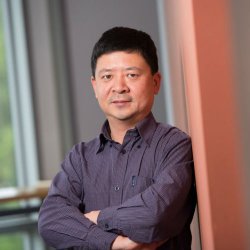Surrey researchers use AI to make mobile networks more efficient
A new artificial intelligence (AI) model, developed by the University of Surrey, could help the UK's telecommunications network save up to 76% in network resources compared to the market's most robust Open Radio Access Network (O-RAN) system – and improve the environmental sustainability of mobile networks by using less energy.

Esmaeil Amiri, who led the research at the University of Surrey, said:
"Our model shows that by using AI, telecommunications providers could use their bandwidth far more efficiently, with only a small additional computational cost. The model could be adapted for other scenarios – like helping drones conserve their batteries or even reducing latency in remote surgery."
This improvement in a network's bandwidth capacity is possible with only minimal computing cost when compared with other O-RANs.

Professor Ning Wang, co-author of the study and Professor in Networks at the University of Surrey, said:
"This solution can dynamically adapt to changes in demand, yet with significantly reduced necessity of reconfiguring the network. This could make our communications networks more robust and more efficient – but the underlying model could have even broader application."
O-RANs have revolutionised the way telecom providers operate – allowing them to shift computing power across their network to respond to changing demand without having to adjust their hardware at base stations.
However, existing technology is not able to easily adapt to rapid changes in demand across the network.
Surrey researchers believe that telecoms providers could take their findings and make their own networks even more efficient. This could not only make their systems more resilient but also save energy consumption.
Now, the proposed scheme could receive further testing in the £7.8m HiperRAN Project, funded by the Department of Science, Innovation and Technology, in which the Surrey team will work with industry partners to bring the technology closer to being ready for roll-out.
Dr. Mohammad Shojafar, also co-author of the study and Senior Lecturer at the University of Surrey, commented:
“This solution aims to design intelligent, robust applications for traffic demands on Open RAN, a prominent next-generation telecom network. This research could be implemented easily, helping shape the next generation of telecommunications networks.”
Featured Academics
Media Contacts
External Communications and PR team
Phone: +44 (0)1483 684380 / 688914 / 684378
Email: mediarelations@surrey.ac.uk
Out of hours: +44 (0)7773 479911

